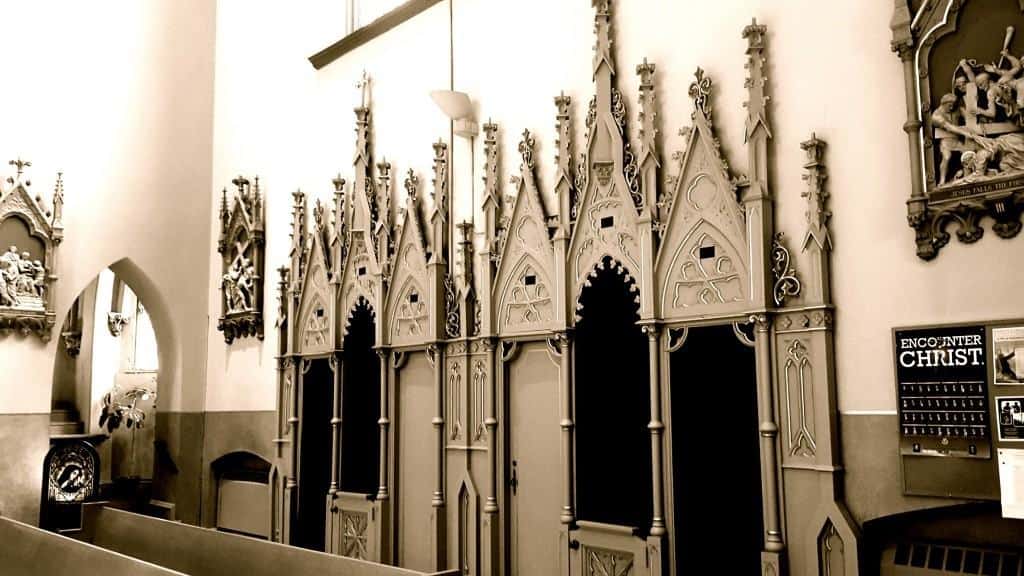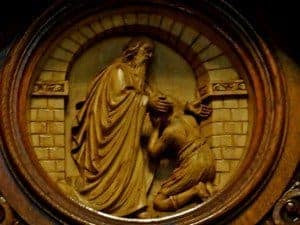To many non-Catholics, and even many Catholics, Confession is one of the biggest mysteries and hurdles surrounding Catholicism. What could be more daunting and unpleasant than admitting my darkest sins to someone? Why not spare myself the shame and anxiety by just sending up a personal (and private) mea culpa to God in the form of a short prayer? So much easier. Truth be told, the idea of confessing one’s sins is pretty counter-cultural, radical even. Admitting a sin is one thing. But to be required to share it? Impossible. That’s asking way too much.
The personal confession of one’s sins has been a part of the Church’s life since the very beginning. Christ could have set it up a different way, but this is how He did it. He gave His apostles and, by way of succession, bishops and priests, the remarkable authority to bind and loose. For over 1,500 years, no one questioned this reality.
I used to see Confession in the same way that many view exercise. Yeah, I know I should do it, but I’ll put it off, or make excuses not to do it. I would go to Confession, but it was fairly infrequent, very hard and I dreaded it. Standing in that line was like waiting for my execution. But then, a number of years ago, all that changed. I came to depend on the Sacrament. Instead of going once every several months, I started going whenever I got the chance. I needed it. It became less intimidating, far less difficult and I began to see it as a healthy challenge for myself. (Who doesn’t like a good challenge?) I stopped seeing it as a cruel punishment and more as a free and inestimable gift. At its deepest level, I can’t explain this transformation, except to chalk it up to a gratuitous divine intervention. But I can pinpoint a few internal changes in my perspective that assisted me.
I suddenly realized that a lot of the fear I experienced was self-inflicted, a result of my restless mind. The devil played off of my fears, using them as a barrier to the Father’s overflowing mercy and love. God helped me to see that He was very eager to pour out His mercy on my soul, and that it was the devil who desperately wanted me to put off receiving that mercy. The choice was mine: Who did I want to listen to? Put that way, it was a pretty easy choice.
I grew tired of dealing with the constant anxiety and fear. My relationship with a loving God shouldn’t be bound up in these gut-wrenching feelings. So I simply chose not to be governed by them anymore. I wasn’t going to give the devil that hand to play against me any longer. The anxiety disappeared. If any residual fears crop up now, I simply tell myself, “Man up and confess. No excuses. No rationalizations. Get it done. Period.” When I’m finished, I always have the feeling of, “Well, that wasn’t so hard, after all.”
Realizing that priests hear hundreds of confessions every year helped me overcome any remaining difficulty with the Sacrament of Penance. Priests hear everything, so there’s really nothing I could say that was so mind-blowing and shocking from the perspective of the priest. When it comes to sin, there really is nothing new under the sun. My sins were not so unique or special that they have not been committed by countless souls over the course of history.
The more I reflected on it, the more I detected a cloaked pride lurking in the back of my mind that exaggerated my faults, making them my own exclusive property, existing beyond the reach of the confessional. Funny how the devil wields pride, even when it comes to the evaluation of one’s own sins. But pride is the devil’s stock-in-trade. He’ll even dress it up as humility if it accomplishes his ends. He’ll tell you that your sins are so egregious that even God won’t forgive them. Or he’ll convince you that the priest, having heard your confession, will shame you out of the confessional. It’s nonsense, but such tactics work.
I also gain a great deal of satisfaction doing something that is so deeply against the grain of today’s warped culture, where personal responsibility has been largely abandoned and replaced with endless excuse-making, finger-pointing and rationalization. We’re constantly told to look everywhere but the mirror when it comes to explaining the reasons for our actions. Taking bold, clear ownership of my sins and shortcomings is self-empowering. Self-mastery is greatly enhanced by freely confronting one’s sins and asking for God’s mercy and help in overcoming them.
In this Jubilee Year of Mercy, make frequent use of the great gift of Confession.
The Catholic religion does not oblige us to reveal our sins indiscriminately to everyone; it allows us to remain hidden from all other men, with one single exception, to whom it bids us reveal our innermost heart and show ourselves for what we are. There is only this one man in the world whom it orders us to disillusion, and it lays on him the obligation of inviolable secrecy, which means that he might as well not possess the knowledge of us that he has. Can anything milder and more charitable be imagined? And yet, such is man’s corruption that he finds even this law harsh, and this is one of the main reasons why a large part of Europe has revolted against the Church.
–Blaise Pascal on Confession, Pensée 978




